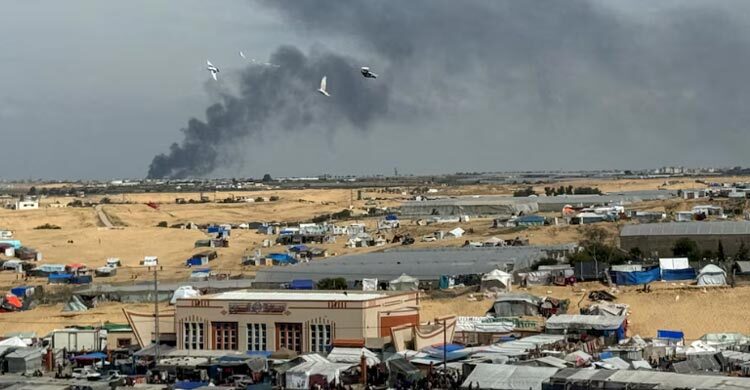Israel approves plan to attack Rafah but keeps truce hopes alive

Israel on Friday approved a potential assault on the Gaza city of Rafah while also keeping ceasefire hopes alive with plans to send another delegation to Qatar for talks on a possible hostage deal with Islamist militant group Hamas, reports Reuters.
Israeli Prime Minister Benjamin Netanyahu's office said he had ok'd a plan to attack the city on the southern edge of the shattered Palestinian enclave where more than half of its 2.3 million residents are sheltering after five months of war.
Global allies and critics have urged Netanyahu to hold off attacking Rafah, fearing mass civilian casualties. But Israel says it is one of the last strongholds of Hamas whom it has pledged to eliminate and that residents will be evacuated.
In Washington, White House national security spokesperson John Kirby said the U.S. had not seen the Rafah plan, but would like to. He told a regular briefing a Hamas ceasefire-for-hostages proposal was within the bounds of what was possible and expressed cautious optimism about it.
Hamas has presented a Gaza ceasefire proposal to mediators and the U.S., which includes release of Israeli hostages in exchange for freedom for Palestinian prisoners, 100 of whom are serving life sentences, according to a proposal seen by Reuters.
A statement from Netanyahu's office on the Rafah attack plan said Hamas' demands for the release of hostages remained unrealistic, but an Israeli delegation would still head to Doha once the security cabinet had discussed its position.
The Israeli statement said the Israeli Defence Force was "preparing operationally and for the evacuation of the population" of Rafah.
It gave no time frame and there was no immediate evidence of extra preparations on the ground.
U.S. Secretary of State Antony Blinken told reporters in Austria the U.S. needed to see a clear and implementable plan from Israel for Rafah, including to get civilians out of harm's way.
Negotiators failed this week to reach a ceasefire agreement in time for the Ramadan Muslim holy month. Washington and Arab mediators are still determined to reach a deal to head off an assault on Rafah and let in food to stave off starvation.
Senior Hamas official Sami Abu Zuhri accused Netanyahu of "manoeuvring ... to conduct more crimes of genocide."
"He isn't interested in reaching an agreement," he told Reuters.
Israel has rejected claims of genocide, saying it is purely focused on destroying all Hamas fighters.
There is increasing friction between Washington and Israel, which officials in President Joe Biden's administration say is waging war with too little care for civilians.
U.S. Senate Majority Leader Chuck Schumer, the highest-ranking Jewish elected U.S. official and a leader of Biden's Democratic Party, called on Thursday for Israelis to replace Netanyahu, whose hardline policies he said were wrecking Israel's international standing.
Biden said on Friday Schumer had made "a good speech" and that many Americans shared those concerns.
In the centre of Gaza City late on Friday, an Israeli air strike destroyed a seven-floor residential building, killing or wounding several people, the spokesman of the civil emergency service there said. He said emergency workers were searching the rubble for casualties.
HAMAS OFFER
More than two weeks after receiving an Israeli-approved proposal for a truce, Hamas gave mediators on Thursday its first formal counter-proposal in more than a month.
Like previous proposals from both sides, the offer, reviewed by Reuters on Friday, foresees dozens of Israeli hostages being freed in return for hundreds of Palestinians held in Israeli jails, during a weeks-long ceasefire that would let in aid.
Hamas also called for talks in a later stage on ending the war, but Israel has said it is only willing to negotiate a temporary truce.
Though Israel did not accept, its description of the terms as "still unrealistic" was notably milder than its response to the previous Hamas offer last month, which Netanyahu called "delusional".
Israeli security cabinet member and National Unity minister Chili Tropper said there were still wide gaps in Israeli and Hamas positions.
"We have to be honest with the public, if we reach a deal that will return our boys and girls home, it will come at a cost, and a heavy one," he told N12 News.
"It won't be at any cost, but we also shouldn't mislead. To bring back these people, who we failed to protect on Oct. 7, we will have to pay a price. What will that cost be? I'll leave that to closed doors."
The war began with an attack by Hamas Islamist fighters from Gaza who killed 1,200 people and seized 253 hostages in Israel on Oct. 7, according to Israeli tallies. Since then, an Israeli assault has killed more than 31,000 people, according to Palestinian figures, and driven nearly the entire population of Gaza from their homes.
FIRST AID SHIP
The United Nations says a quarter of Gazans are on the verge of famine and on Friday, the first ship bringing aid by sea, the Open Arms, arrived off Gaza.
Israel said 130 pallets of humanitarian equipment and 115 tonnes of food and water were offloaded to World Central Kitchen (WCK) charity's trucks for distribution after security checks.
If the new sea route is successful, it may help to ease hunger in Gaza, where hundreds of thousands of people face malnourishment and hospitals in the worst-stricken northern areas have reported children dying of starvation.
However, aid agencies have repeatedly said that plans to bring in aid by air and sea would be far from sufficient as long as most access by land is restricted.
Israel, which has sealed off all land routes into Gaza apart from two crossings on the territory's southern edge, denies blame for hunger and says aid agencies should do a better job.
Distribution of the limited aid that arrives has been chaotic and frequently violent.
In one of the worst reported incidents yet, Gaza health authorities said at least 21 people had been killed and 150 wounded at a queue for aid near Gaza City on Thursday night and blamed Israeli forces for shooting into the crowd.
Israel denied its troops were to blame and said Hamas fighters had opened fire. Reuters was not able to independently confirm either account.





